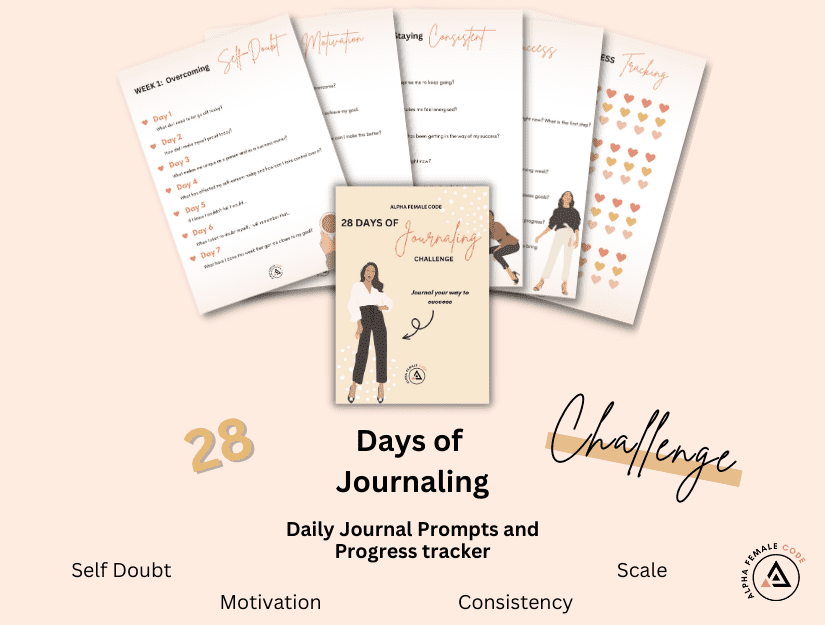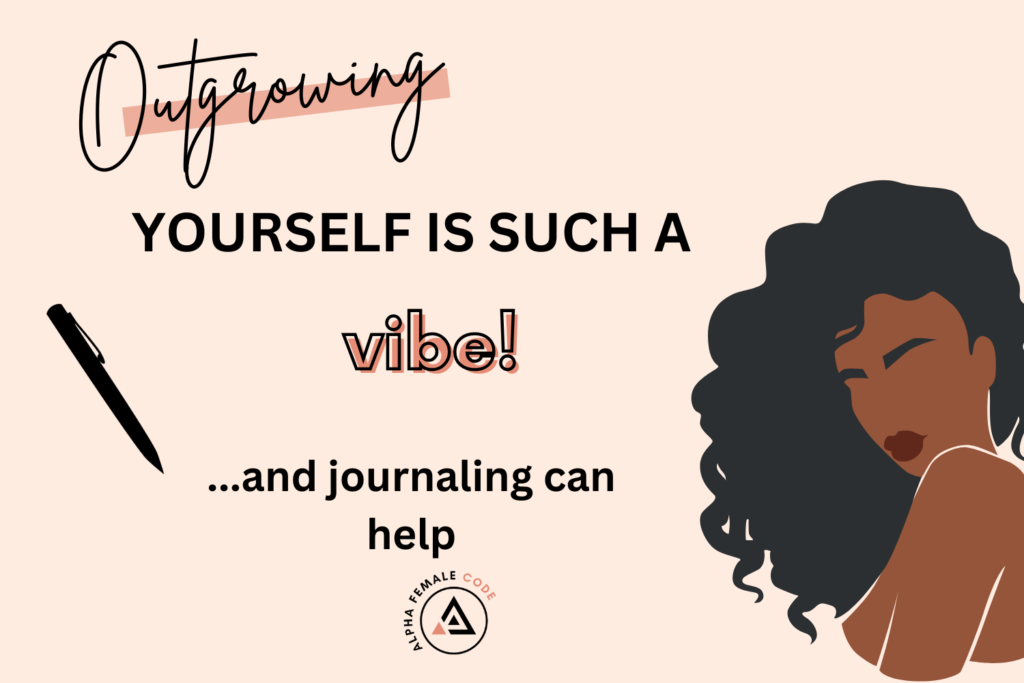
Journaling is one of those exercises that is often overlooked. Why? Well because it’s so simple…I mean when you stop and say to yourself that you can write your way to success it can seem a little bit silly. But as usual, the simplest strategies are often the most effective.
So, if you are amongst the skeptics are seriously urge you to give it a go because if you do it consistently it can transform you and your life.
As you will find out in this post there are many different types of journaling, each with its own unique transformative benefits. However, at the end of the day, journaling is all about writing your thoughts so that you can make sense of your internal world.
You can use this guide to help you get started and develop the journaling ritual that best suits you.
Disclaimer: This site contains affiliate links to products. We may receive a commission for purchases made through these links. Visit my disclaimer page for more information.

How journaling helps entrepreneurs?
The benefits of journaling for entrepreneurs are endless and likely very individual and specific to your own business type and strategy as well as experience.
But for most entrepreneurs journaling is a great way to write down your thoughts, clarify your goals and make plans more concrete. It helps to keep you accountable. In the face of challenges, it is a way to remind yourself of why you started and why you should keep going.
If that’s not enough, journaling can also help your entrepreneurial creativity – writing down your thoughts is a way to come up with novel ideas, and experiment with new approaches, in a safe place ; ).
This can lead to fresh perspectives, breakthrough insights, and innovative solutions that entrepreneurs may not have considered otherwise.
Overall, journaling can be a powerful tool for personal growth and development, which in turn can lead to better decision-making and success as an entrepreneur.
Why is journaling better than thinking?
…you might be thinking. And it is a good question.
Why spend time writing things down when you can just ponder on your thoughts and ideas in your head? Surely that’s more efficient?
Thinking and journaling are both important tools for personal growth and wellbeing, but they serve different purposes.
Thinking allows for the immediate and flexible processing of information. But journaling has many additional benefits which you cannot access by thinking alone.
It provides a more coherent and structured thought process and is a far more in-depth way of analyzing the information, self-reflecting, and capturing your thoughts and emotions.
THINKING
Thinking is the process of generating and processing thoughts and ideas in the mind. It is an immediate and flexible tool that can be used to generate new ideas, make connections between different pieces of information, and make decisions quickly.
JOURNALING
On the other hand, is the practice of writing down thoughts, feelings, experiences, and observations in a structured and permanent way. Journaling can provide clarity and structure to one’s thoughts and emotions and can also be used for self-reflection and problem-solving.
In summary, thinking is a more immediate tool for processing information, while journaling is a more permanent tool for capturing and reflecting on thoughts and experiences. Both have their benefits and can be used in combination to enhance personal growth and wellbeing.
Can journaling change your mindset?
Yes, journaling can have the potential to change one’s mindset.
The act of writing down thoughts, feelings, and experiences can provide a space for self-reflection and introspection, allowing individuals better to understand their thoughts, emotions, and experiences. This process can lead to greater awareness, insight, and understanding, which can influence one’s mindset and beliefs.
In addition, journaling can help with managing negative thoughts and emotions, promoting a more positive outlook, and developing gratitude and mindfulness practices.
By regularly journaling, individuals can gain a better understanding of their patterns of thought and behaviour and make intentional changes to improve their mental and emotional well-being.
It’s important to note that journaling is not a one-size-fits-all solution, and results will vary from person to person. However, many people find journaling to be a useful tool in changing their mindset and improving their overall wellbeing.
What are the 3 types of journaling?
TO RECORD INSPIRATIONS
Best for: generating and keeping a record of ideas.
This is the type of journaling where you simply write down your thoughts, ideas, and experiences.
It is the best type of journaling. If you want to explore new ideas, if you are feeling stuck, or in need of some manifestation and visualisation – just let it flow out on paper. Keep a record and go back to it as needed.
Sometimes great ideas come at the most random of times. This is another reason why keeping a journal handy to jot your random throughs down is useful. It is an account of your inspirations.
FOR PROCESSING
Best for: processing emotions and overcoming challenges.
This type of journaling is best for when you need to process your emotions or make a decision. It provides a space to reflect on your thought and express yourself and gain clarity and insight into your inner world.
Undoubtedly, there will be some tough times during your business journey. If there isn’t then you’re doing something wrong ; ). Journaling can also help you cope with stress because it acts as an outlet for your emotions.
So, what is the best approach for using journaling to process emotions?
- writing regularly.
- being honest and authentic in your writing.
- using prompts or questions to explore your emotions.
FOR PLANNING AND GOAL SETTING
Journaling can also be a useful tool for planning and setting goals. By reflecting on your thoughts and desires, you can gain clarity and focus on what you want to achieve.
Write down your goals, both short-term and long-term, and explore why they are important to you. You can also consider what obstacles you might face and how you can overcome them.
Once you have clarity about your goals and visions you can begin to record a plan of action and the necessary steps you need to take to achieve your goals.
Reflect on your experiences and think about how you can apply what you’ve learned to future planning.
RELATED POSTS
How to clarify the goal to guarantee success?
How to plan your day effectively like a Boss Babe?
15 Signs of personal growth you should embrace!
What are the 10 benefits of journaling for entrepreneurs?

Gain more confidence.
Journaling is your safe place – a safe place for self-reflection. Regularly taking up journaling is an amazing way to identify and focus on your strengths as well as notice the areas of weakness, that you can begin to strive to improve. It also helps you see with greater clarity what you are proud of and collectively, all these things can be to shape your positive self-image.
In addition, it can also help you identify and address negative thought patterns that contribute to low self-confidence and help to reframe past experiences and see them in a more positive light. By reflecting on your experiences and exploring your thoughts and emotions, you can see how they have shaped you and gain new perspectives and insights that can help you overcome self-doubt. And make you feel more confident in the present.
When you feel confident you will have the momentum to show up in your business and feel motivated to work towards your goals.
Process your emotions.
During your entrepreneurial journey, you will have to face your deepest self. That’s scary – because your most bottled-up fears, doubts, and negative emotions will surface at different stages.
Writing about your feelings can help you release emotions that may have been bottled up, and this is literally the most important step needed for you to move past your past experiences. Holding onto past emotions from past events can cause you to experience a lot of stress and anxiety in the present and prevent you from moving forward with your goals.
Journaling can provide insight into your emotions and help you understand the underlying causes of your feelings, leading to greater self-awareness. When you have an insight into the patterns and triggers for those negative emotions that is when you can begin to develop effective coping strategies for managing them.

Track your progress.
Writing down your goals and tracking your progress can help you stay motivated and on track. By reviewing your journal regularly, you can see your progress over time.
By writing about your experiences, you can gain insights into what has worked well and what hasn’t, and make changes accordingly.
Journaling can also be a useful tool for tracking habits and by writing about these activities regularly, you can identify areas for improvement and make changes as needed.
Self-development and growth.
Journaling can be a great way to identify areas for growth so that you can being to make meaningful changes in YOUR LIFE.
Self-development is one of those things that does not get enough attention when it comes to entrepreneurship – yet success starts with you so working on being the best you can seems like the most important place to invest in before all else.
An added benefit of journaling for self-development can also help you track your progress over time – now that will add a lot of motivation.
Clarify your goals.
Writing down your goals and aspirations can help you understand what is important to you and what you value most. By reflecting on your values, you can make sure that your goals align with your priorities. This is vital because staying laser focused and putting your energy into the areas of business that are most important will grow your success exponentially.
Journaling can also help you refine and adjust your goals as needed because essentially you are keeping a record of all your actions and progress over time. As you reflect on your progress and experiences, you may realize that some of your goals are no longer relevant or that you need to make adjustments.
This helps to redirect your actions away from the things that are irrelevant so you can maximise the amount of time and energy you spend on the most business-valuable actions.
Break negative thought patterns.
When you write down your thoughts, it becomes easier to identify negative thought patterns and question their validity. This can help you develop a more balanced and positive perspective, and challenge irrational or self-defeating beliefs.
By reflecting on your thoughts and experiences, you can gain new insights and perspectives that can help you shift your thinking in a more positive direction.
How can you make the most of journaling for this purpose?
Well, try to approach journaling with a non-judgmental attitude and avoid negative self-talk. Instead, focus on being honest and self-compassionate as you reflect on your thoughts and emotions.
Reduce anxiety and overwhelm.
Research suggests that writing about one’s emotions and experiences can help reduce stress and improve overall well-being.
When you’re feeling anxious or overwhelmed, it can be difficult to think clearly which can ultimately impact the amount of brain power you are able to devote to your business.
Now, this is something you do not want. At any stage of your entrepreneurial journey, you’re most likely handling many things at the same time. So, when you do come to sit down and work on your business, you want to make sure you maximise that time and stay efficient.
Journaling can help you work through negative emotions and gain control over your mind so you can focus on the things that matter to you the most.

Find inspiration.
Journaling is a self-reflective exercise which means it is a great tool for identifying new insights and generating new ideas. So allows your creativity to free-throw through writing.
There are a few ways that journaling can help you find inspiration.
First, set aside a specific time each day or week to journal, and make it a consistent habit. When it comes to journaling consistency is really the KEY.
Be open-minded and don’t censor your thoughts. This can be a bit intimidating at first because it can bring to the surface things that might surprise you. Allow yourself to write down everything that comes to mind, even if it seems silly or irrelevant.
Use prompts to get your creative juices flowing. Ask yourself questions like “What would I do if I had no fear?” or “What would I like to learn this year?” These simple questions can prime your mind into a problem-solving slash creative gear.
Experiment with different forms of writing such as free-form writing, bullet points, lists, or even drawings or doodles.
Improve mood.
Journaling is a simple yet effective tool for enhancing mental well-being and improving mood. The process of putting thoughts and feelings into words has been shown to have a therapeutic effect, allowing individuals to better understand and manage their emotions.
Journaling is a therapeutic activity that can help improve mood by providing a space for reflection, self-expression, and emotional release.
By reflecting on past events, people can gain a deeper understanding of their experiences, which can ultimately help them move forward in a more positive direction.
By expressing their emotions through writing, individuals can relieve their psychological burden, leading to reduced symptoms of anxiety or lower mood.
Focusing on positive experiences and gratitude in a journal can help individuals increase their overall well-being and mood. Research has shown that regularly practicing gratitude can increase happiness and life satisfaction.
Journaling can help individuals develop a more positive outlook and increase their resilience to stress. By reflecting on past challenges and their ability to overcome them, individuals can gain a greater sense of self-efficacy and confidence in their ability to handle difficult situations.
Build motivation and focus.
By journaling, you can develop a clearer sense of purpose and direction. This clarity can increase motivation and focus, leading to greater success in achieving goals. It is also a good way to track your progress and identify obstacles to success.
Regularly practicing journaling can help you develop self-discipline and improve your time management skills. By setting aside regular time for journaling, you can develop a routine that can help you be more productive and focused. Additionally, by reflecting on your goals and progress, you’ll be able to gain a greater sense of accountability, leading to increased motivation and a stronger commitment to your goals.
Some examples of journal prompt for motivation might include:
- What are my goals for the next month/year?
- What progress have I made towards my goals this week/month?
- What challenges have I faced and how have I overcome them?
- What habits or routines would help me achieve my goals?
- What resources do I need to achieve my goals?
What are the top 5 journals?

Bullet Journal
The beauty of a bullet journal is its flexibility and customization. Users can create their own layout, choose the information they want to track and change their system as needed. It’s a great tool for individuals who want to stay organized and productive, as well as for those who enjoy creative expression through journaling.
Some popular uses for a bullet journal include tracking daily tasks, planning, and goal setting, keeping a daily diary, and capturing ideas and inspirations.
Gratitude Journal
A gratitude journal is a personal journal where individuals write down things they are thankful for. It is a way to reflect on positive experiences and focus on the good in life. Regularly practicing gratitude has been shown to have psychological benefits, such as increased happiness, improved relationships, and decreased stress levels. To start a gratitude journal, one can simply set aside time each day to write down three to five things they are grateful for, along with a short explanation or reflection.
Some common gratitude journal prompts include:
- What am I grateful for today?
- Who are the people in my life I am thankful for and why?
- What small things in my life bring me joy?
- What am I proud of accomplishing today?
- What am I grateful for in my home/living situation?
Law of Attraction Journal
The Law of Attraction journal is a type of journal that focuses on using the principles of the Law of Attraction to manifest desired outcomes. The Law of Attraction is a philosophical idea that states that positive thoughts and feelings can attract positive experiences and outcomes into one’s life.
Law of Attraction journal prompts is questions or statements that can help individuals focus their thoughts and align them with their desired outcomes.
The important thing is to find prompts that encourage focusing on desired outcomes and positive thoughts.
Some common Law of Attraction journal prompts include:
- How do I want to feel today and why?
- What are some positive things I can imagine happening in my life today?
- How can I take action toward my goals today?
- What are some positive things I can imagine happening in the future?
- What are some challenges I am facing and how can I reframe them in a positive light?
Goal Setting Journal
A goal-setting journal is a personal journal where individuals write down their goals and track their progress toward achieving them. The purpose of a goal-setting journal is to provide a structured way to plan, prioritize, and achieve personal and professional goals.
In addition to writing down goals, a goal-setting journal can also be used to record affirmations, track habits, and reflect on personal growth and development. It can serve as a tool for accountability and motivation and can be a valuable resource for setting and achieving personal and professional goals.
5-Minute Journal
The 5-Minute Journal is a structured journal designed to help individuals start and end each day on a positive note. The idea behind the journal is that spending just five minutes each morning and evening reflecting on gratitude, setting intentions, and affirming personal values can help improve overall well-being and increase happiness.
The goal is to complete the journal quickly and consistently each day, making it a habit that becomes integrated into one’s daily routine.
